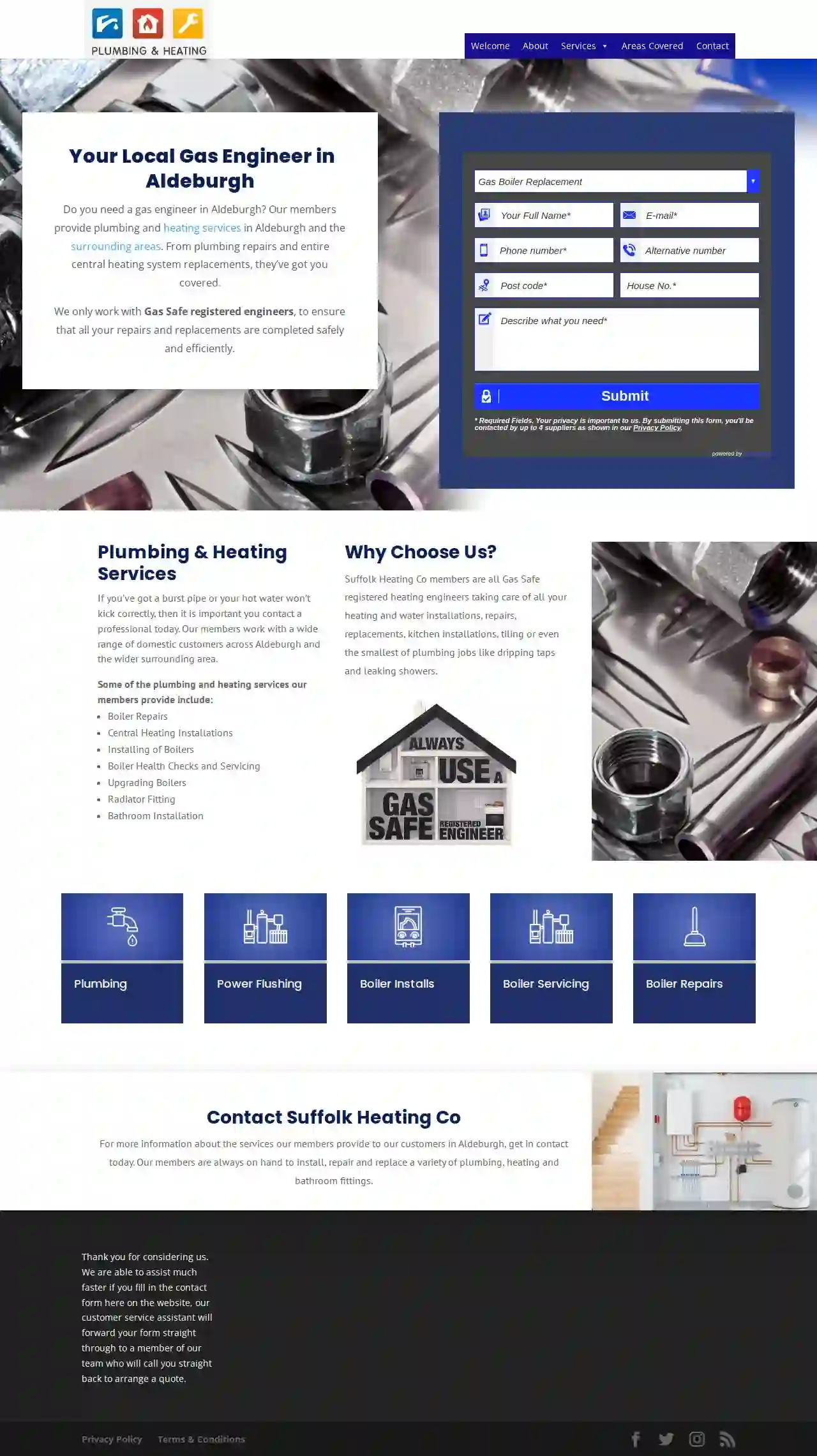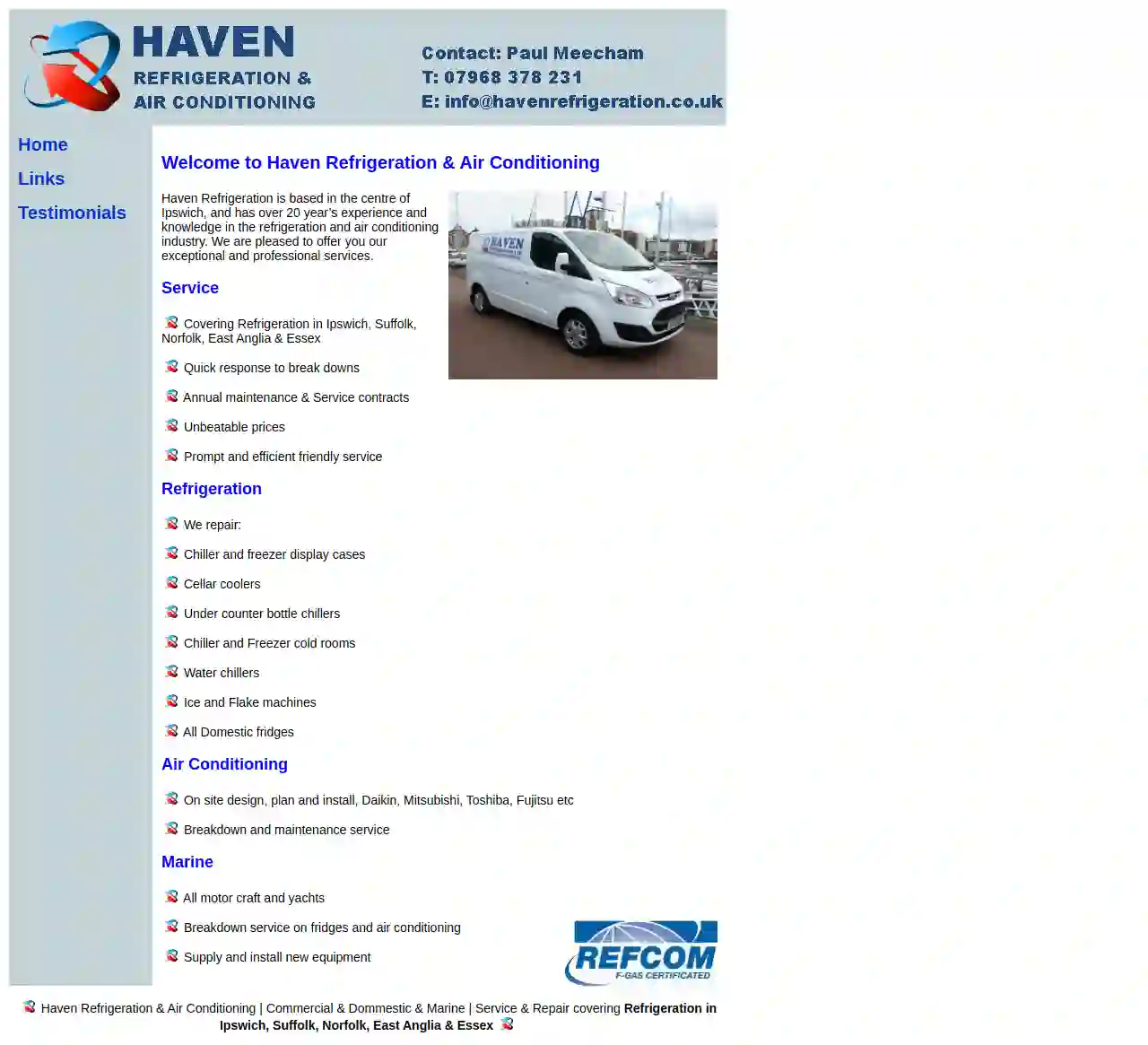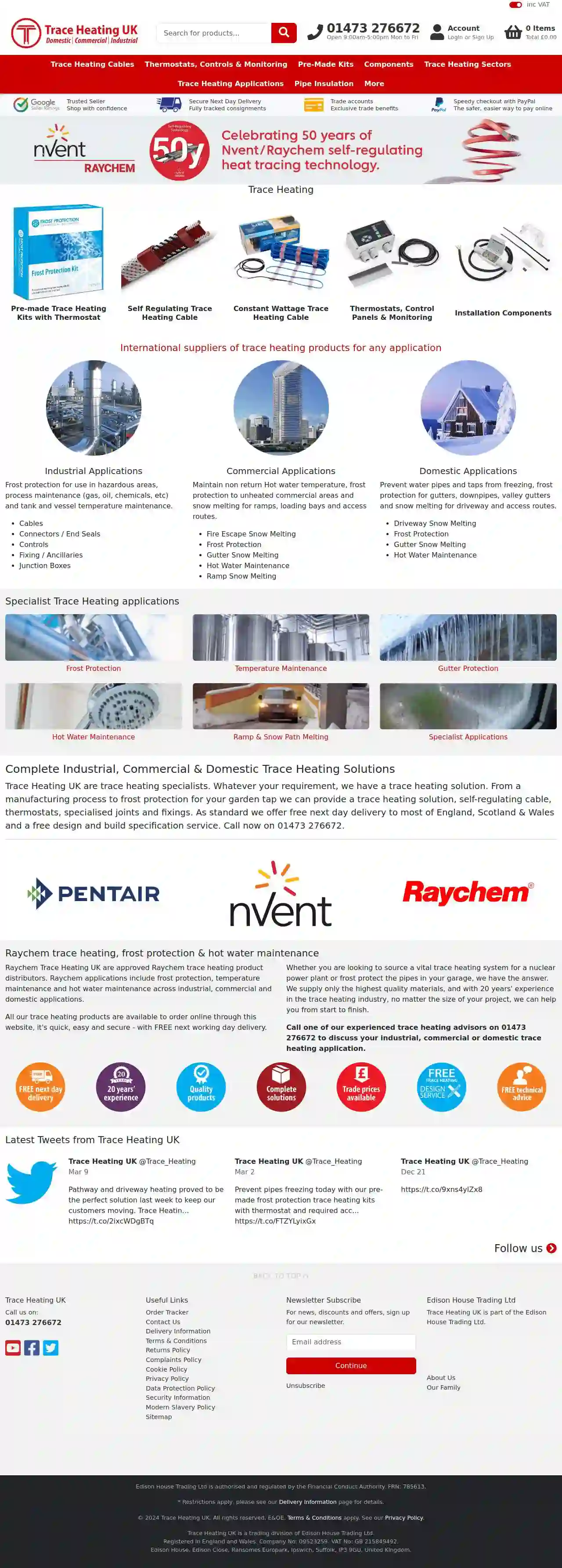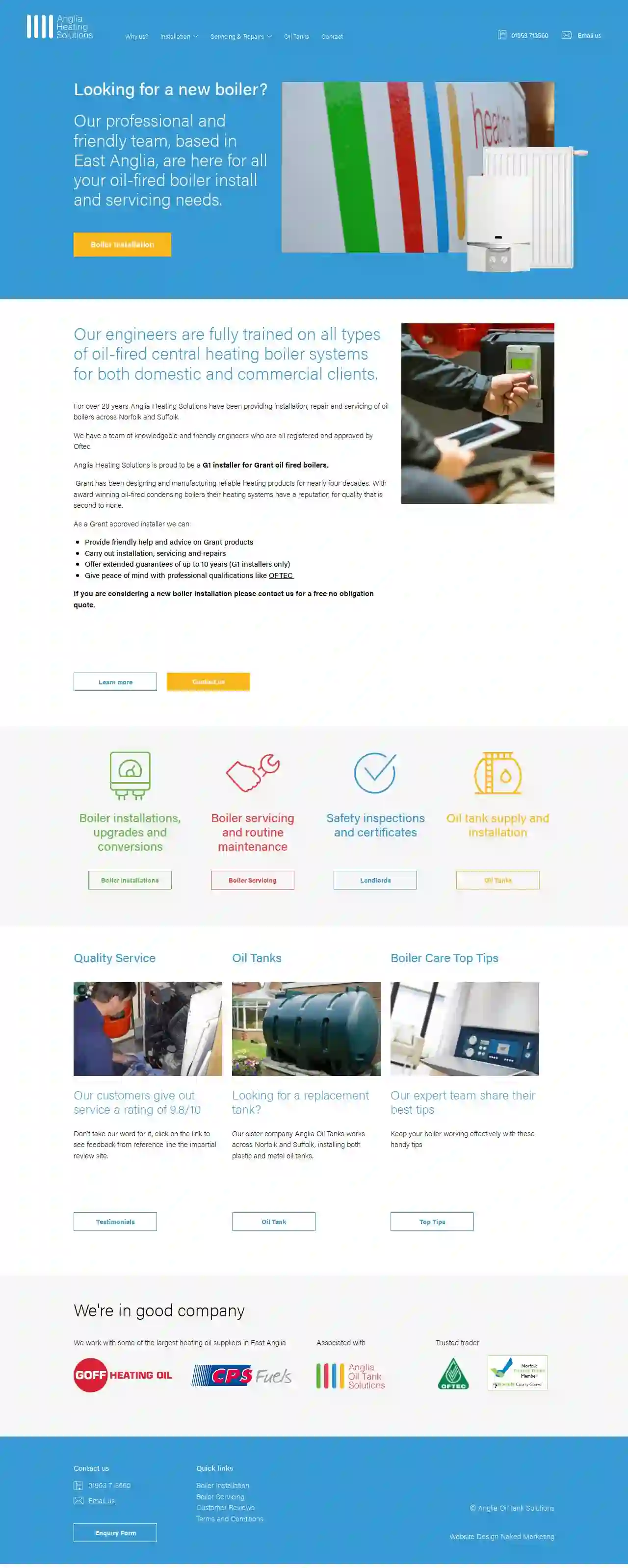HVAC Companies Brandon
Top Air Conditioning Services in Brandon
Get multiple HVAC Contractor quotes for your project today! Compare profiles, reviews, accreditations, portfolio, etc... and choose the best service.

Heat Trace Global
Edison Close, Ransomes Europark, Edison House, Ipswich, IP3 9GU, GBWith 20 years' specialist heat trace experience we can supply complete heat trace solutions for any application, worldwide. Heat Trace Global are approved Raychem trace heating product distributors. Raychem applications include frost protection, temperature maintenance and hot water maintenance across industrial and commercial applications.Whether you are looking to source a vital trace heating system for a nuclear power plant or frost protect the pipes in your garage, we have the answer. Heat Trace Global supply only the highest quality materials, and with 20 years' experience in the trace heating industry, no matter how big or small your project, we can help you from start to finish. Heat Trace Global are approved Raychem, nVent and Pentair heat trace product distributors. Call +44 1473 559089 for advice
- Services
- Why Us?
- Accreditations
- Gallery
Get Quote
Andrew Goldson Heating & Gas Services Ltd
4.667 reviewsCarlton Colville, Lowestoft, 16 Airedale, NR33 8TJ, GBAndrew Goldson Heating & Plumbing Engineers are a small family business with over 30 years of experience. We cover most of Norfolk & Suffolk, and we pride ourselves on fitting quality products at realistic prices. We fit new gas central heating systems, and service and repair gas and LPG appliances. Our after care service is second to none, as we ensure that our installations continue to be highly efficient for many years afterwards.All our estimates are free, and we have a “no fix, no fee” policy for all boilers that are out of warranty. This is available to new and old customers alike.
- Services
- Why Us?
- Accreditations
- Our Team
- Testimonials
- Gallery
Get Quote
Martin Keeble
56 reviewsIpswich, GBSuffolk Heating Co members are all Gas Safe registered heating engineers taking care of all your heating and water installations, repairs, replacements, kitchen installations, tiling or even the smallest of plumbing jobs like dripping taps and leaking showers. We only work with Gas Safe registered engineers, to ensure that all your repairs and replacements are completed safely and efficiently. If you’ve got a burst pipe or your hot water won’t kick correctly, then it is important you contact a professional today. Our members work with a wide range of domestic customers across Suffolk and the wider surrounding area. Some of the plumbing and heating services our members provide include: Boiler Repairs, Central Heating Installations, Installing of Boilers, Boiler Health Checks and Servicing, Upgrading Boilers, Radiator Fitting, Bathroom Installation.
- Services
- Why Us?
- Gallery
Get Quote
Haven Refrigeration & Air Conditioning
53 reviewsIpswich, GBWelcome to Haven Refrigeration & Air Conditioning. Haven Refrigeration is based in the centre of Ipswich, and has over 20 year’s experience and knowledge in the refrigeration and air conditioning industry. We are pleased to offer you our exceptional and professional services. Covering Refrigeration in Ipswich, Suffolk, Norfolk, East Anglia & Essex. Quick response to break downs, Annual maintenance & Service contracts, Unbeatable prices, Prompt and efficient friendly service.
- Services
- Why Us?
- Testimonials
- Gallery
Get Quote
Subzero Air Conditioning & Refrigeration
525 reviews91 Kerry Avenue, Ipswich, IP1 5LF, GBSubzero Air Conditioning & Refrigeration is a team of commercial, industrial and domestic air conditioning and refrigeration engineers. We serve clients in Suffolk, Ipswich and the surrounding areas. We are F-Gas registered engineers. We take pride in providing quality service for our customers throughout the Essex, Ipswich, and Suffolk areas. With careful attention to every detail, we can undertake all your service needs at affordable prices. All the refrigeration or air conditioning repair or installation services we offer will ensure the longevity of your appliances. From refrigeration appliance and air conditioning installation to repair work, our technicians can take care of it all with ease. We can offer you a free no-obligation quote and a 24-hour emergency call out service. We come with over 20 years of experience in this field, so you can rest assured that you will receive professional and expert service, no matter what the task.
- Services
- Why Us?
- Accreditations
- Gallery
Get Quote
Kings Cooling Solutions Ltd
4.930 reviewsStowmarket, Not specified, E3 Atex Business Park, Gun Cotton Way, IP14 5XE, GBKing's Cooling Solutions Ltd is a family run business, our staff have in excess of 50 years experience in the air conditioning and refrigeration industry. We are based in Stowmarket near Bury St Edmunds and cover Suffolk, Norfolk and Cambridgeshire. We have a Planned Preventive Maintenance (PPM) contract to cover all of your commercial refrigeration equipment. Our PPM contracts are cost effective and flexible to suit individual requirements. A PPM contract is essential to ensure that your commercial refrigeration and air conditioning equipment remains in good working order and operates at optimum efficiency. We also offer repair and maintenance services for all types of packaged Chiller systems, including scheduled maintenance to prevent untimely chiller failures, regular care to identify refrigerant issues, and frequent leak testing to ensure compliance with current refrigerant law (FGAS) and maintain efficiency levels and optimum performance.
- Services
- Why Us?
- Accreditations
- Our Team
- Testimonials
- Gallery
Get Quote
Trace Heating UK
513 reviewsEdison House, Edison Close, Ransomes Europark, Ipswich, IP3 9GU, GBWelcome to Trace Heating UK, a leading supplier of trace heating products for industrial, commercial, and domestic applications. With over 20 years of experience in the industry, we offer a wide range of products, including self-regulating trace heating cable, thermostats, control panels, and monitoring systems. Our products are designed to provide frost protection, temperature maintenance, and hot water maintenance for various applications. We are proud to be a trusted supplier of Raychem trace heating products and offer free next day delivery to most of England, Scotland, and Wales. Our team of experienced advisors is always available to help you find the right solution for your needs. Contact us today to learn more about our products and services.
- Services
- Why Us?
- Accreditations
- Gallery
Get Quote
A D Pope Vehicle Repairs Ltd
4.850 reviewsSouth Lowestoft Industrial Estate, 10-18 Pinbush Road, Lowestoft, NR33 7NL, GBA.D. Pope Vehicle Repairs is a team of long established and trusted vehicle mechanics, offering excellent car servicing and repair services in Lowestoft and the surrounding areas. With over 40 years' experience, we provide competitively priced garage services, including tyre fitting, puncture repairs, air conditioning re-gassing, electronic diagnostics, exhaust and battery replacements. Our experienced mechanics can repair all makes and models of vehicles, and we offer MOT tests by appointment. We are members of the Good Garage Scheme and accept all major card payment methods.
- Services
- Why Us?
- Accreditations
- Gallery
Get Quote
Anglia Heating Solutions
52 reviewsStanfield Road, Wymondham, NR18 9QY, GBLooking for a new boiler? Our professional and friendly team, based in East Anglia, are here for all your oil-fired boiler install and servicing needs. Boiler Installation Our engineers are fully trained on all types of oil-fired central heating boiler systems for both domestic and commercial clients. For over 20 years Anglia Heating Solutions have been providing installation, repair and servicing of oil boilers across Norfolk and Suffolk.We have a team of knowledgable and friendly engineers who are all registered and approved by Oftec.Anglia Heating Solutions is proud to be a G1 installer for Grant oil fired boilers. Grant has been designing and manufacturing reliable heating products for nearly four decades. With award winning oil-fired condensing boilers their heating systems have a reputation for quality that is second to none. As a Grant approved installer we can: Provide friendly help and advice on Grant products Carry out installation, servicing and repairs Offer extended guarantees of up to 10 years (G1 installers only) Give peace of mind with professional qualifications like OFTEC If you are considering a new boiler installation please contact us for a free no obligation quote. Learn more Contact us Boiler installations, upgrades and conversions Boiler Installations Boiler servicing and routine maintenance Boiler Servicing Safety inspections and certificates Landlords Oil tank supply and installation Oil Tanks Quality Service Our customers give our service a rating of 9.8/10 Don't take our word for it, click on the link to see feedback from reference line the impartial review site. Testimonials Oil Tanks Looking for a replacement tank? Our sister company Anglia Oil Tanks works across Norfolk and Suffolk, installing both plastic and metal oil tanks. Oil Tank Boiler Care Top Tips Our expert team share their best tips Keep your boiler working effectively with these handy tips Top Tips
- Services
- Why Us?
- Accreditations
- Gallery
Get Quote
Artic Fox HVAC Corp.
4.810 reviewsIpswich, GBAt Artic Fox HVAC Corps, we pride ourselves on providing top-notch heating, ventilation, and air conditioning services to our customers. With a focus on customer satisfaction and a commitment to excellence, we strive to deliver the best possible results for every project we take on. Our team of experienced professionals is dedicated to ensuring that every customer receives the highest level of service and attention to detail. Whether you're looking for routine maintenance, repairs, or new installations, we've got you covered. Contact us today to learn more about our services and how we can help you achieve your goals.
- Services
- Why Us?
- Gallery
Get Quote
Over 12,692+ HVAC Contractors on our directory
Our HVAC companies operate in Brandon & beyond!
HVACCompaniesHub has curated and vetted the Best HVAC Contractors in and around Brandon. Find a top & reliable contractor today.
Frequently Asked Questions About HVAC Companies
- What is the source of the problem? Get a clear explanation of the issue and what caused it.
- What are my repair options? Discuss different repair solutions, if applicable, and their associated costs.
- Are there any preventative measures I can take? Find out if there are steps you can take to prevent future problems.
- Do you recommend a repair or replacement? If repairs are extensive or the system is old, consider replacement.
- What are the warranties on parts and labor? Understand the warranties before agreeing to any repairs.
- Do you have any customer reviews or testimonials I can check? Reputable HVAC technicians are often happy to provide references or direct you to customer reviews.
- Check Online Reviews: Look for HVAC companies with positive reviews and high ratings on platforms like Google, Yelp, and others.
- Ask for Referrals: Reach out to friends, family, neighbors, or colleagues for recommendations.
- Verify Licensing and Insurance: Ensure the company is properly licensed and insured to operate in your area.
- Look for Certifications: Check for certifications from reputable organizations like NATE (North American Technician Excellence).
- Compare Quotes: Get quotes from multiple HVAC companies to compare pricing and services.
- Use a Directory like HVACCompaniesHub: Simplify your search by using our directory of pre-screened and qualified HVAC professionals.
- AC not cooling: Refrigerant leaks, compressor issues, or thermostat problems.
- Furnace not heating: Pilot light or ignition control issues, blower motor problems, or clogged filters.
- Uneven temperatures: Ductwork leaks, inadequate insulation, or faulty thermostats.
- Poor air quality: Dirty air filters, mold growth in ductwork, or inadequate ventilation.
- Strange noises: Unusual sounds from the system can indicate a variety of problems with different components.
- High energy bills: Inefficient systems, ductwork leaks, or improper thermostat settings.
What should I ask an HVAC technician during a service call?
How do I find a good HVAC company near me?
Finding a reputable HVAC company requires research. Consider these tips:
How long does an HVAC system last?
What are the most common HVAC problems?
Common HVAC problems include:
What should I ask an HVAC technician during a service call?
- What is the source of the problem? Get a clear explanation of the issue and what caused it.
- What are my repair options? Discuss different repair solutions, if applicable, and their associated costs.
- Are there any preventative measures I can take? Find out if there are steps you can take to prevent future problems.
- Do you recommend a repair or replacement? If repairs are extensive or the system is old, consider replacement.
- What are the warranties on parts and labor? Understand the warranties before agreeing to any repairs.
- Do you have any customer reviews or testimonials I can check? Reputable HVAC technicians are often happy to provide references or direct you to customer reviews.
How do I find a good HVAC company near me?
Finding a reputable HVAC company requires research. Consider these tips:
- Check Online Reviews: Look for HVAC companies with positive reviews and high ratings on platforms like Google, Yelp, and others.
- Ask for Referrals: Reach out to friends, family, neighbors, or colleagues for recommendations.
- Verify Licensing and Insurance: Ensure the company is properly licensed and insured to operate in your area.
- Look for Certifications: Check for certifications from reputable organizations like NATE (North American Technician Excellence).
- Compare Quotes: Get quotes from multiple HVAC companies to compare pricing and services.
- Use a Directory like HVACCompaniesHub: Simplify your search by using our directory of pre-screened and qualified HVAC professionals.
How long does an HVAC system last?
What are the most common HVAC problems?
Common HVAC problems include:
- AC not cooling: Refrigerant leaks, compressor issues, or thermostat problems.
- Furnace not heating: Pilot light or ignition control issues, blower motor problems, or clogged filters.
- Uneven temperatures: Ductwork leaks, inadequate insulation, or faulty thermostats.
- Poor air quality: Dirty air filters, mold growth in ductwork, or inadequate ventilation.
- Strange noises: Unusual sounds from the system can indicate a variety of problems with different components.
- High energy bills: Inefficient systems, ductwork leaks, or improper thermostat settings.